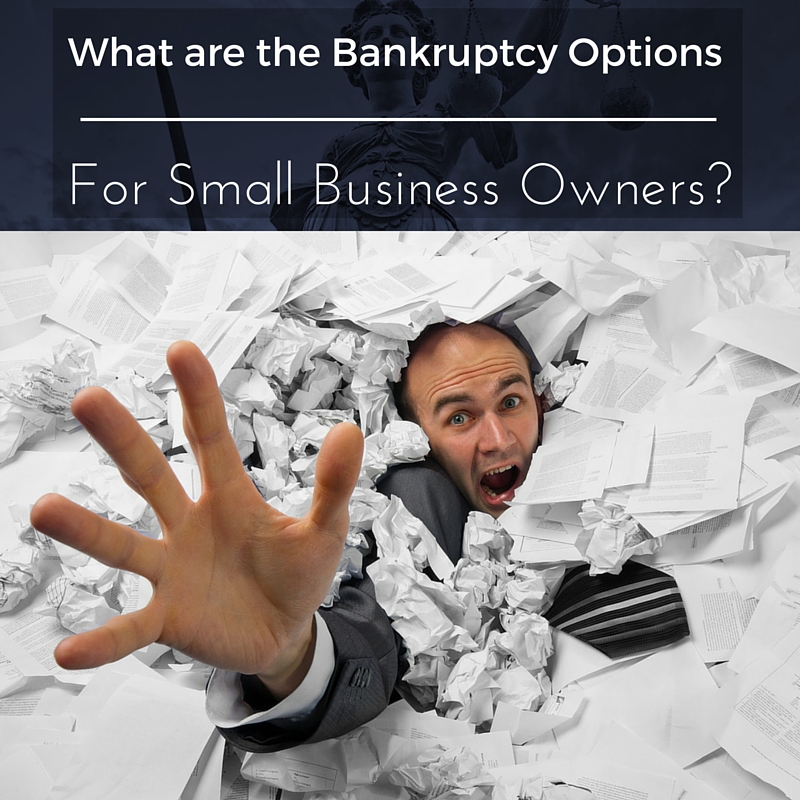What are the Bankruptcy Options For Small Business Owners?

Through bankruptcy, debt-ridden business owners can opt to either efficiently close their businesses or work to stay afloat and remain open. The relief that can be obtained by a small business will depend on both the type of bankruptcy that is filed as well as on the business itself. Under both Chapters 11 and 13, small businesses are able to remain open while making smaller monthly payments to their creditors. If a business is unable to make smaller payments due to a lack of cash flow, then Chapter 7 bankruptcy allows the business to close efficiently.
If bankruptcy is being considered, it is important to choose the correct bankruptcy chapter. Different business entities will be affected in different ways, and some types may open you up to litigation or impact your personal finances.
Bankruptcy options for small business sole proprietorships
Sole proprietors are not separate from their businesses. If you are a sole proprietor, you hold personal responsibility for the debts owed by your business. This means that if you choose to file bankruptcy, you’ll have to include all of your business and personal assets and debts.
Sole proprietors and Chapter 7 bankruptcy
The primary benefit of filing for Chapter 7 bankruptcy protection when you are a sole proprietor is that all of your qualifying personal and business debts will be discharged. This means that once the bankruptcy is complete, you will not be required to make further payments on your discharged debts. Not all types of debts are discharged through bankruptcy, however, and it is important for you to check with your bankruptcy attorney about which debts you may still be required to pay after your bankruptcy is completed.
On the other hand, all of your personal and business assets that are not exempt will become part of your bankruptcy estate. Under the federal law as well as some state laws, certain types of property are exempt from inclusion in the bankruptcy estate. Exempt property types may be kept by you. Assets that are not exempt may be sold by the bankruptcy trustee. He or she then distributes the sale’s proceeds to your creditors. Many people are able to keep a majority of their property if they do not own a significant amount. Others have large estates, meaning that a Chapter 7 bankruptcy may not be the best option because you might lose assets that are important to you.
Sole proprietors and Chapters 11 and 13 bankruptcy
Chapters 11 and 13 bankruptcies allow business owners to make payments over time while their businesses stay open. Chapter 13 has debt limits established for eligibility, so if your debts exceed those limits, then Chapter 11 is a secondary option. To be eligible, your business must take in enough money each month in order to make the required monthly payments. This is a good choice if you have a business that you want to keep open and that takes in enough money to continue operating as well as to make smaller payments each month to your creditors. It also may be a good choice if you either want to retain more assets than you could under Chapter 7 or if you don’t qualify under that chapter.
Partnerships and corporations and their options for bankruptcy
It is common for corporations and partnerships to file for business bankruptcy protection. The business debts of these two types of entities are not discharged, however, and they do not have exemptions available to them.
The pros and cons of Chapter 7 bankruptcy for corporations and partnerships
Winding down a business that is failing is generally much easier through Chapter 7 bankruptcy than without it. Under Chapter 7, you do not have the tasks involved with selling your remaining fixtures, products, or equipment, and you also do not have to work to collect your accounts receivable. The trustee of the bankruptcy estate will take on the responsibility of liquidating the assets of the business and distributing the proceeds to the business’s creditors. This helps to both streamline the process involved in winding down your business while also helping to prevent creditors from claiming that your business has committed fraud.
Partnership debt is not dischargeable, and partners are held to be personally responsible for the debts of their business. This makes it important for you to understand that Chapter 7 bankruptcy will not erase your responsibility to pay the remaining bills owed by your business. For corporations, shareholders do have protection from being held to be individually liable, but there are still risks involved when filing for Chapter 7 bankruptcy protection. It is sometimes fairly easy for creditors to file alter ego litigation, which is a type of lawsuit asking that the bankruptcy court force the shareholders to pay the debts of the bankrupt corporation.
Pros and cons of Chapter 11 bankruptcy for corporations and partnerships
While corporations and partnerships are not allowed to file for Chapter 13 bankruptcy, Chapter 11 provides a method for these entities to continue operating while paying smaller monthly amounts to pay off their debts. Creditors do have additional rights under this chapter, making it cost-prohibitive for many small businesses.
If you are a business owner who is struggling to keep your business afloat because of unmanageable debt, bankruptcy may be an option to consider. Contact our business bankruptcy attorneys today to schedule your consultation so that you can learn more about what bankruptcy options for small business might work best for you.



